Key takeaways:
- Experiential learning enhances understanding through hands-on experiences and reflection, as demonstrated by organizing and attending music events.
- Events foster community, empowerment, and innovation by integrating theory with practice, allowing participants to engage and connect creatively.
- Electronic music labels play a crucial role in mentoring emerging artists, building collaborative communities, and curating music that resonates with audiences.
- Evaluating event outcomes using personal stories and emotional resonance is essential for understanding the true impact of learning experiences.
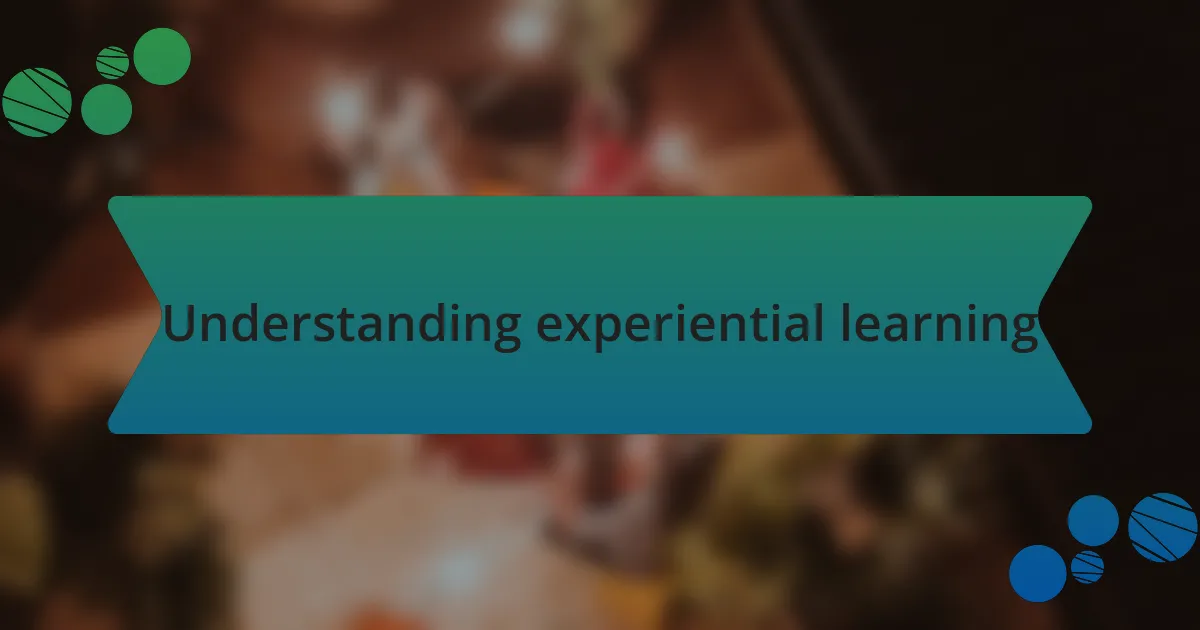
Understanding experiential learning
Experiential learning revolves around the idea that we learn best through experience and reflection. I recall a time when I organized a live electronic music event. The energy of the crowd and the direct feedback from attendees provided a unique opportunity for real-time learning that no textbook could replicate. It made me wonder—how often do we miss these moments when we solely focus on theory?
Immersing ourselves in hands-on experiences allows for deeper understanding. During that same event, I observed how different aspects of production and performance impacted the audience’s reaction. It struck me that witnessing this connection between artist and listener was far more enriching than any seminar could convey. Isn’t it fascinating how these spontaneous interactions can shape our skills and knowledge?
Reflecting on these experiences is just as crucial as the hands-on component. After the event, I took the time to gather feedback from attendees and performers alike, which opened up new perspectives I hadn’t considered. This process of reflection prompted me to ask myself: what did I learn about engagement and creativity? The answers I found were invaluable, underscoring that experiential learning is a cycle of doing, reflecting, and evolving.
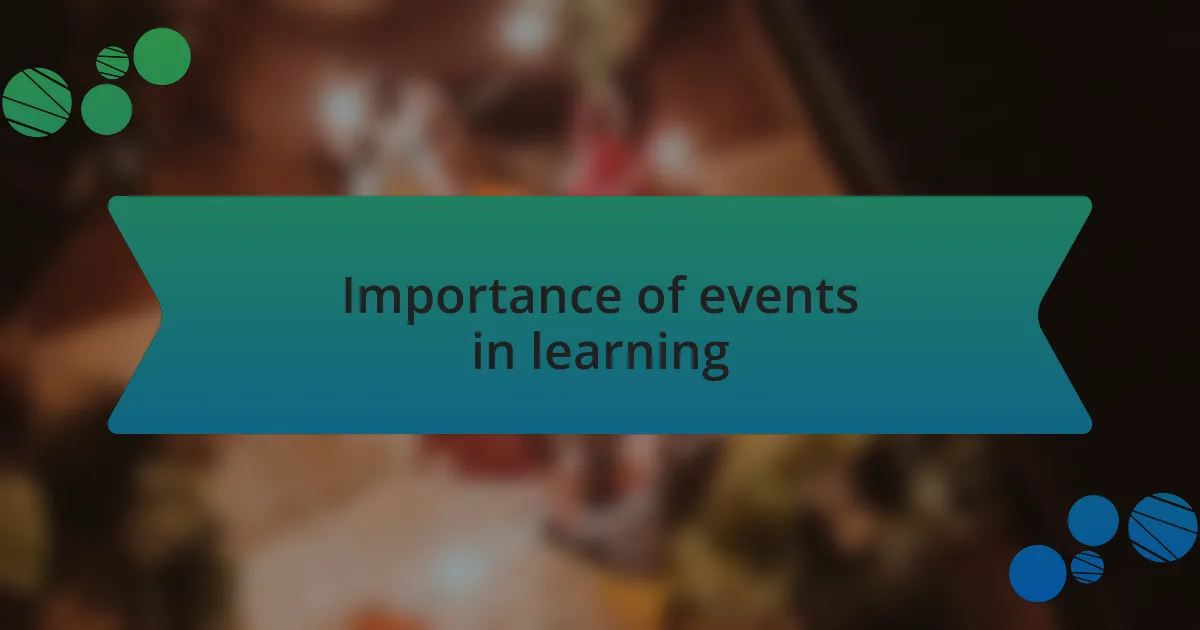
Importance of events in learning
The significance of events in learning cannot be overstated. I remember attending a workshop right after hosting my own event, where we dove into the intricacies of sound design. The hands-on activities we engaged in allowed me to apply theories in real scenarios, reinforcing my grasp on complex concepts. Have you ever had that moment when everything just clicks after trying it out yourself?
Events serve as dynamic learning platforms, mixing theory with practice in vibrant ways. One particularly memorable moment came during a collaborative jam session at a festival. Sharing ideas with fellow artists while experimenting in real-time created an electric atmosphere, fostering innovation and sparking creativity. It’s moments like these that nurture a sense of community and push us to step out of our comfort zones.
There’s also an undeniable empowerment that arises from actively participating in events. After leading a panel discussion on the future of electronic music, I felt inspired by the diverse perspectives shared. Engaging directly with the audience not only deepened my knowledge but built confidence in my ability to facilitate meaningful conversations. Isn’t it interesting how learning through events can ignite a passion that drives us to explore further?
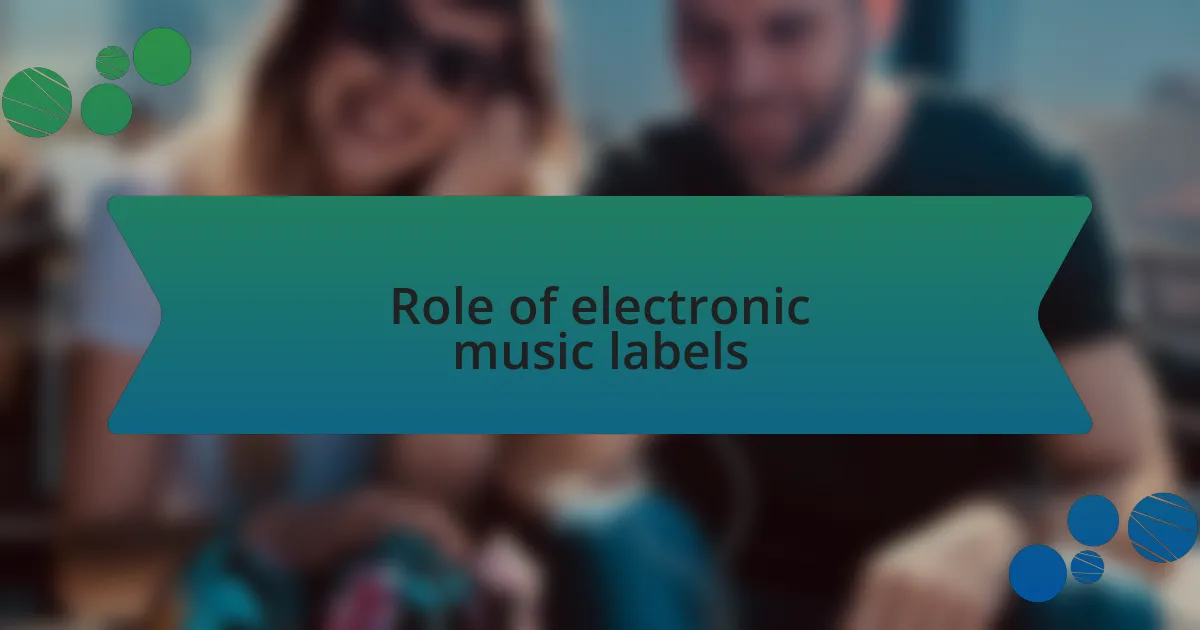
Role of electronic music labels
Electronic music labels play a pivotal role in shaping the industry, acting as gateways for emerging talent. I recall my first experience with a label that not only gave me a platform but also guided me through the intricacies of music production. It felt like opening a treasure chest filled with knowledge that transformed my creative process. How incredible is it to have a mentor who helps you fine-tune your artistry?
Beyond artist representation, electronic music labels foster communities that thrive on collaboration and innovation. I remember meeting fellow enthusiasts at a label-hosted event, where our shared passion created instant bonds. This sense of belonging sparks inspiration. Have you ever felt that rush when surrounded by like-minded individuals who push you to think outside the box?
Labels also have the responsibility to curate and distribute music that resonates with audiences, guiding trends while staying true to the genre’s roots. I’ve experienced firsthand the gratification of seeing my work released under a reputable label, knowing it was part of a carefully crafted selection aimed at connecting with listeners. Isn’t it fascinating how that connection can be both personal and universal at the same time?
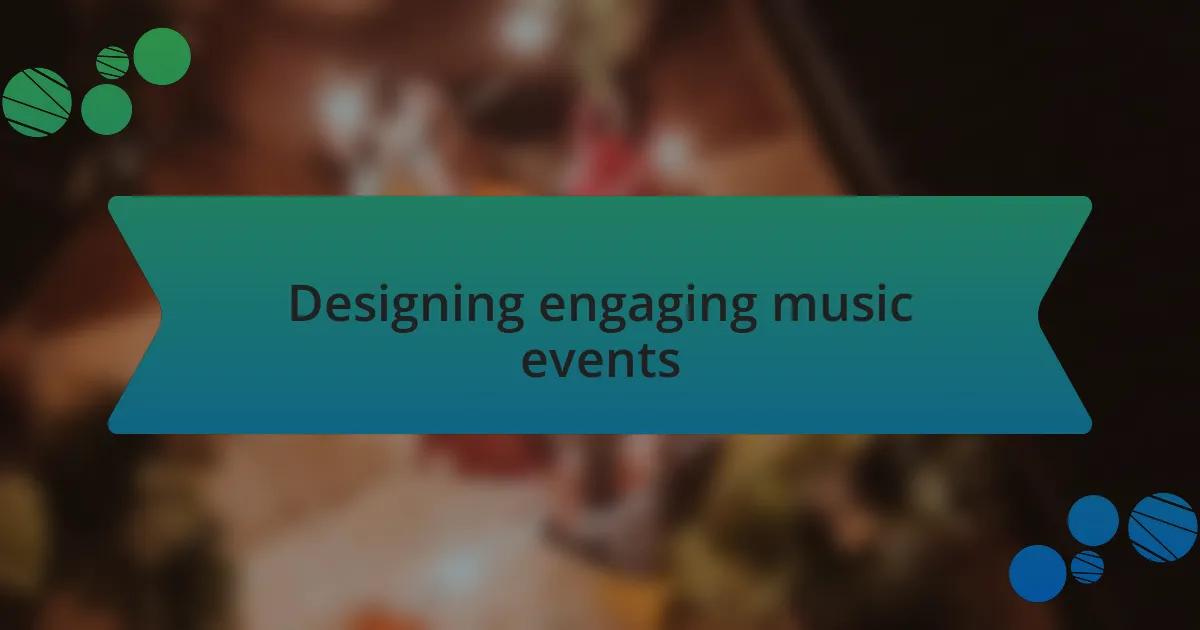
Designing engaging music events
Creating engaging music events requires careful attention to the atmosphere and experience you wish to deliver. I recall a specific outdoor festival I attended; the vibrant visuals and immersive soundscapes didn’t just entertain—they transformed the space into a shared journey. How essential it is to recognize the power of ambiance in shaping attendees’ memories!
One effective approach is to involve attendees in interactive activities that deepen their connection to the music and each other. During a recent event I was involved with, we set up art installations and participatory workshops that encouraged guests to express themselves creatively. I saw firsthand how laughter and collaboration sparked unexpected friendships. Isn’t it remarkable how music can not only resonate with us personally but also connect us socially?
Moreover, incorporating technology can elevate the event experience significantly. At one event, we used apps that allowed attendees to vote for the next track or even engage in live Q&A with the DJs. This blend of music and tech invited a dialogue that transcended the usual spectator experience. Have you ever thought about how empowering it feels to influence the flow of an event you’re a part of?
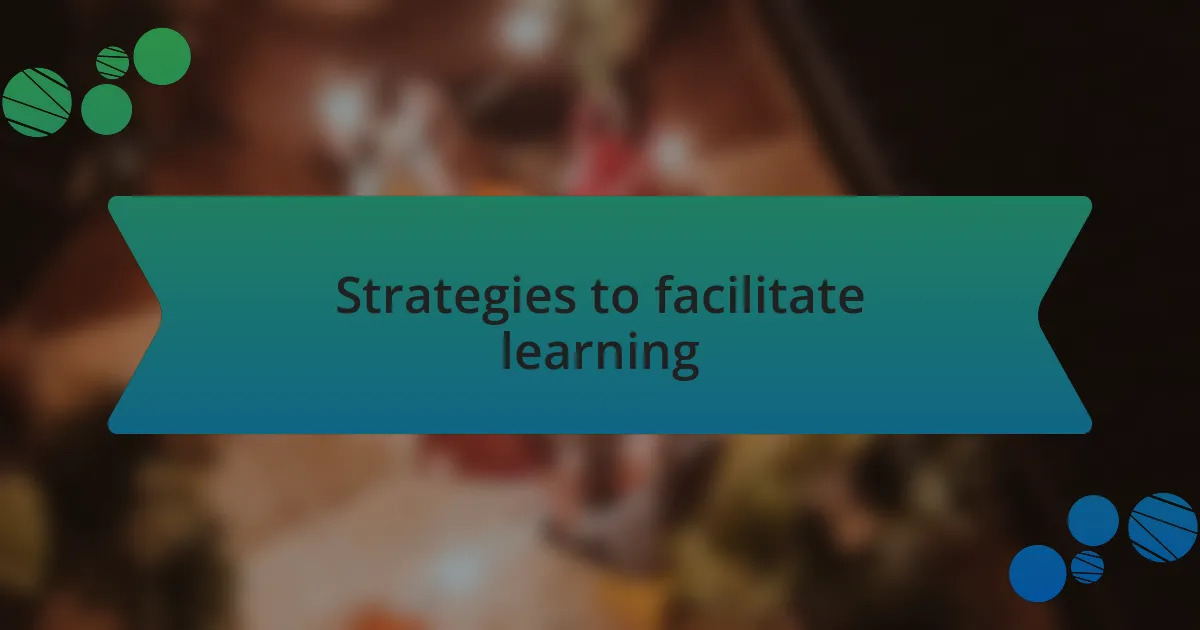
Strategies to facilitate learning
One strategy I find particularly effective is creating themed events that align with attendees’ interests. For instance, I once hosted a workshop dedicated to vinyl culture, where participants could bring their favorite records and share the stories behind them. The passion in that room was palpable; it transformed a simple gathering into a heartfelt exchange of memories and nostalgia. Isn’t it amazing how a theme can not only captivate but also bond people over common experiences?
Another approach is to incorporate peer-led discussions, where participants can share insights and experiences freely. At a recent tech and music convergence event, I facilitated a panel where aspiring producers discussed their struggles and triumphs. I was struck by how much knowledge we each gained from the stories shared; it was as if the energy in the room shifted as individuals connected over similar journeys. Have you ever found inspiration in someone else’s struggles?
Finally, using hands-on demonstrations can make complex concepts more accessible. During an event focused on sound design, we set up stations where attendees could experiment with synthesizers and effects in real-time. Witnessing the excitement on participants’ faces as they created unique sounds reminded me of the joy that comes from discovery. Isn’t it fulfilling to translate theory into practice in such an engaging manner?
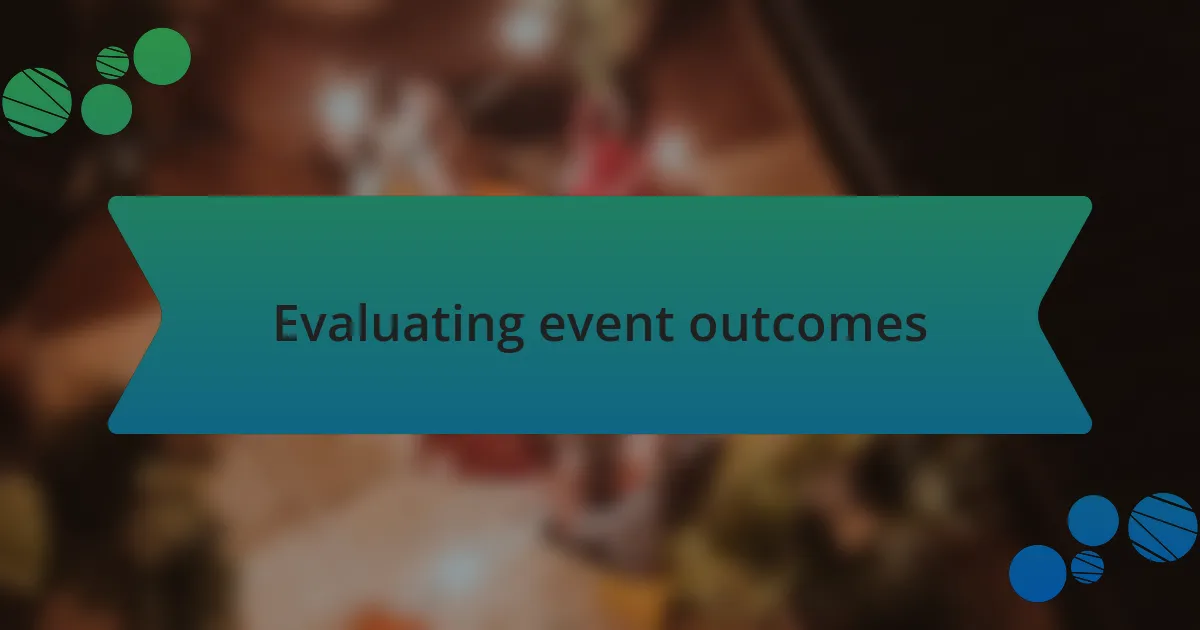
Evaluating event outcomes
Assessing event outcomes involves more than just numerical feedback; it’s about the stories and experiences that emerge. For instance, after an immersive workshop on live DJing, I asked attendees to describe their most impactful moments. The responses were overwhelming; many shared how they felt empowered to try new techniques and connect with their own creative identities. Isn’t it fascinating how individual experiences can reflect the collective atmosphere of the event?
I have also found that comparing before-and-after surveys can yield valuable insights about participants’ growth. After a recent sound engineering seminar, I noticed a notable increase in confidence among attendees when asked about their technical skills. The shift in their self-perception was exhilarating to witness, and it underscored the importance of creating a supportive learning environment. How often do we realize just how much we can evolve through shared knowledge?
Ultimately, the emotional resonance of an event can be the strongest indicator of its success. At one of my recent festivals, I took time to watch interactions unfold between participants. The genuine connections formed and the laughter exchanged told me everything I needed to know—better than any statistic could. Isn’t that the true essence of experiential learning, where memories and relationships are created in the process?
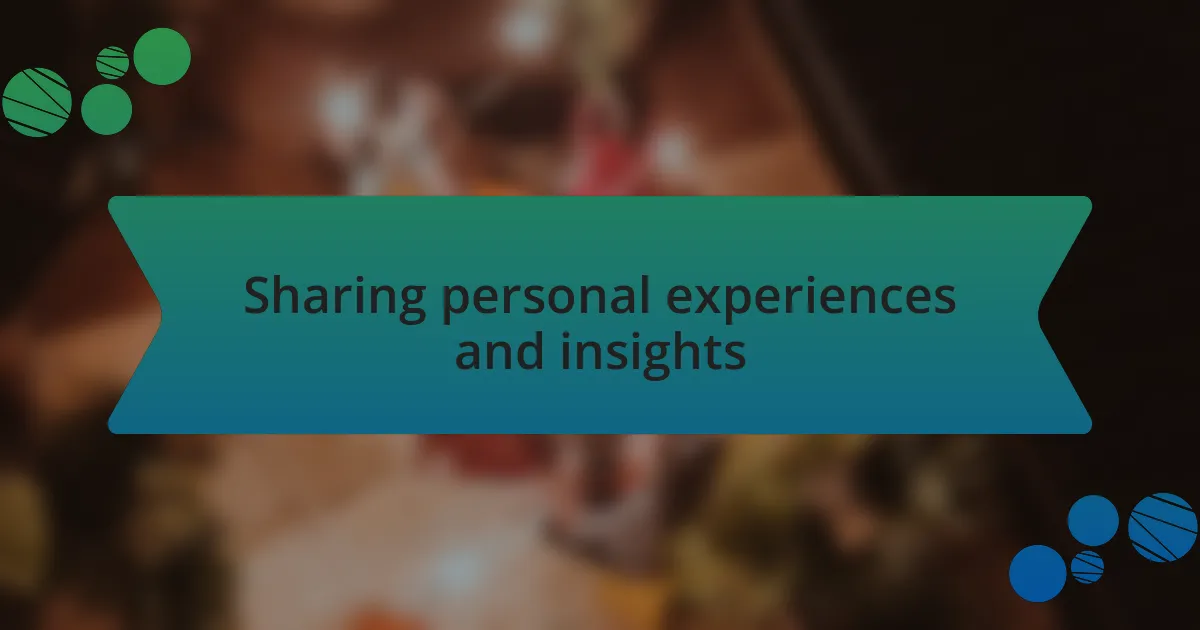
Sharing personal experiences and insights
Sharing personal insights during an event can transform the learning experience for everyone involved. I remember a time when I opened the floor for attendees to share their creative journeys after a collaborative music-making session. One participant’s story about overcoming their fear of performing live resonated deeply with others, prompting a wave of vulnerability and connection that enriched the entire group. It was a reminder to me that our stories are powerful tools for fostering community.
I often encourage attendees to reflect on their own experiences and how they relate to the themes we explore. At a recent workshop on music production, I asked participants to journal about a moment that influenced their sound. Many shared stories of personal challenges that shaped their music; these insights not only deepened their artistic expression but also created a sense of solidarity among us. Isn’t it remarkable how vulnerability can open the door to creativity?
Through sharing, I’ve discovered that our collective experiences often hold the key to understanding and growth. After a panel discussion about the future of electronic music, I was struck by how one participant’s candid thoughts about their struggles with imposter syndrome sparked a thoughtful dialogue. It made me realize that addressing these common fears can empower others to embrace their unique voices, and isn’t that what we strive for in things like experiential learning?